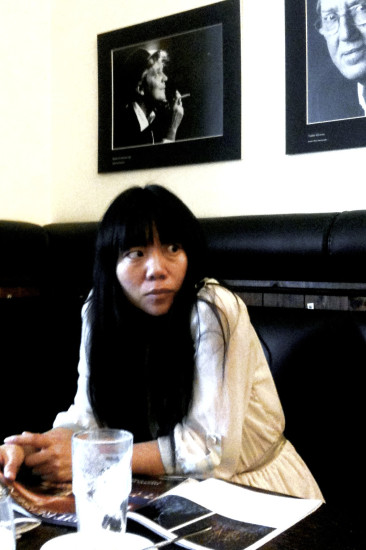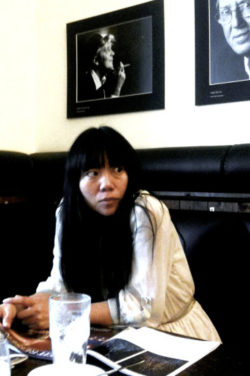
X
iaolu Guo doesn’t hide her qualms about Western publishing. Last week the London-based novelist and filmmaker made book-world news when she told Jonathan Franzen and the rest of a panel at the Jaipur Literature Festival that American lit is “massively overrated.” She took issue in particular with a simplistic brand of narrative realism that she says has been foisted upon readers worldwide, saying that, in Asia, “our reading habit has been stolen and changed.” Conservatism with regard to form, she told me in an interview, is just one piece of the “commercial censorship” that pervades New York publishing houses.
But Guo also readily expresses some indebtedness to Western literary culture, citing French novelists as some of her early influences. Having grown up in rural China, she began writing in English not long after moving to the U.K. in 2002 and published A Concise Chinese-English Dictionary for Lovers—her first novel in the language—a few years later. She had already written several books in Chinese and opened the Jaipur panel by saying that writing in a foreign tongue was a kind of liberation from self-censorship, implying that it allowed her to be more direct. “If you live in China,” she said, “you need to play around in order to live as an artist. Otherwise, you’re in prison.”
A Concise Chinese-English Dictionary, Guo told me, was also part of an “awakening” to the possibilities of literature for her. Its young Chinese narrator has a limited command of English and, as the story opens, she’s on her way to London where she’ll live while the language of her narration matures—sometimes quite awkwardly. The conceit risks coming off as gimmicky, but the novel is carried by the authenticity of its voice; there are familiar tropes like dropped articles and missing auxiliary verbs, but also the kind of chance poetry produced by being new to a language—“massive sky,” “walking down to the night street.”
The most important thing for an artist or an author is to continue her work. Languages and settings are the tools but not the first thing.
Guo was named to Granta’s list of Best of Young British Novelists in 2013. Her latest book, I Am China, will be out in the U.K. this June and in the U.S. in September. Via email we discussed translator shortages, confronting censorship in the East and West, and UFO in Her Eyes—a project Guo has rendered in both book and movie form and which unfolds in a village plagued by the strange fits and starts of rural Chinese development.
—Pamela Cohn for Guernica
Guernica: You’ve said that as a teenager you “didn’t read Confucius or haiku—[you] read Marguerite Duras and Jean Genet.” Can you talk about how you were introduced to French literature and other foreign art? What books and films were available to you when you were young?
Xiaolu Guo: I was a village youth, so there was a limited supply when it came to foreign culture. But perhaps that’s why I was so drawn to it. The Western literature translated in the ’80s by Chinese state publishers were classics like The Great Gatsby, Italo Calvino novels, and lots of French fiction. I was instantly drawn to Duras’s essay style, as well as to the U.S. literature of the Beat Generation. Russian literature and cinema were also major influences for Chinese intellectual culture at the time, given the political and historical connection between China and the Soviet Union. But only when I became a 20-something, did I begin to understand the layers of meaning in a book like Mikhail Bulgakov’s The Master and Margarita.
Guernica: How did you come to start writing in English? How do you decide which language to work in on a given project?
Xiaolu Guo: It’s not a choice. Either I write or I don’t, especially when I’m in a foreign culture. I’ve lived in London for years, and I must continue my writing and filmmaking. The most important thing for an artist or an author is to continue her work. Languages and settings are the tools but not the first thing.
Guernica: I’d say it still takes a significant amount of effort to write in a language that isn’t your mother tongue, no matter how strong the drive to create. Was there really no part of the move to publish six original works in English that happened on a conscious level?
Xiaolu Guo: When I came to the U.K. ten years ago, everyone told me I couldn’t send my books directly to publishing houses—that I had to go through a literary agent. So I did, and then I found out the agents couldn’t provide a translator or read my Chinese. There was—there still is—a big shortage of good Chinese-English literary translators. So for two years in London, I was stuck waiting, not writing, with several Chinese books I couldn’t get translated.
That’s when I decided to write in English, since I had been living here and had decided to reconstruct my life here. Even if I wrote in broken English, it was better than getting bored and weary and bitter on the long queue of authors waiting to be translated by a stranger. That decision was really liberating; I managed to find some [viable] ways to approach the foreign language in A Concise Chinese-English Dictionary for Lovers. It was written as a linguistic exercise and was an awakening for me in terms of using ‘other’ ways to create literature.
Our readers and cinemagoers have been trained to read and watch very mainstream stuff. It’s like being given sleeping pills.
Guernica: In light of your comments in Jaipur, what keeps you writing in English? Why contribute to an overrated literature rather than bolster one that’s underrated?
Xiaolu Guo: I am not very interested in naturalist-realism—neither in the Chinese nor the American context. I think our literary tradition has to evolve, has to explore its form and its spirit through writers and thinkers, rather than let the lazy, easy traditional narrative—which is controlled by the publishing industry—roll all over the readers and dominate the market. I think our readers and cinemagoers have been trained to read and watch very mainstream stuff. It’s like being given sleeping pills. It sends people to a non-reflective sleep state. Here I’m talking about the spirit of literature, rather than the trivial technical sides; it goes beyond language and nationality.
Guernica: In a profile in the Independent you’re quoted as saying “there’s strong self-censorship inside every artist.” In context, I presume you mean Chinese artists. How much of that self-censorship stays with you after leaving China?
I couldn’t believe it. I had lived most of my life in China, and I didn’t know that political and commercial censorship for fiction existed in the United States.
Xiaolu Guo: Self-censorship happens not only in China, or Iran or ex-Soviet places. It can happen anywhere. If an artist penetrates a certain taboo or a certain power through their work, he or she will face this problem. I’m always saying that commercial censorship is our foremost censorship globally today. Why do we still pretend we are free?
Guernica: What are your own experiences with commercial censorship?
Xiaolu Guo: There’s an abortion section in A Concise Chinese-English Dictionary. In the beginning my U.S. editor wanted to take it out. She said the Bush government had just issued some policies and that middle-class readers wouldn’t like it, which would reduce the market. I was very angry. I couldn’t believe it. I had lived most of my life in China, and I didn’t know that political and commercial censorship for fiction existed in the United States. Perhaps I was really naïve but you could imagine that in China we’re told the West is a free world. I had a big argument with my editor, and eventually that section was saved. It’s still included in the U.S. edition.
When we submitted I Am China to the U.S. publishers, many houses turned it down, saying it would be very difficult to market. I got more than ten rejections. It’s a novel with multiple narrative layers and sort of an intellectual spirit. The rejections were very much market-oriented, which isn’t a new thing of course, and I totally understood their fears and concern. Anyway, Nan/Doubleday in New York liked my work and they’re publishing it, for which I feel grateful.
Guernica: Are your films subject to censorship procedures in China? A project like UFO in Her Eyes contains a good deal of critique with regard to what happens (and what has happened) when Maoist and capitalist principles meet. Did you have to tone down the critique at all in the film versus the book?
Xiaolu Guo: None of my films can be shown in China. I’ve managed to show them once or twice at film festivals in Hong Kong and Taipei. That’s all. All my documentary films are very much commentaries on the harsh Chinese reality. UFO in Her Eyes can’t circulate on the mainland—neither book nor film, although they’re totally different. Somehow, in the novel format, I don’t really like to do upfront, ideological discussion. In my heart, literature remains a poetic and ambiguous medium. On the other hand, I trained as a documentary filmmaker in film school, so my films very much reflect reality and socio-political problems. They’re less subtle I would say. My most recent film Late at Night: Voices of Ordinary Madness is a study of Britain’s underclass society. I was filming street people, beggars, and tramps around London. These characters had really heartbreaking stories.
Guernica: In your essay on Mo Yan winning the Nobel Prize, you express some frustration that Western media pay more attention to “dissident” Chinese artists than “state artists.” Can you expand on that? Why do you think the West is more interested in dissidents?
Xiaolu Guo: For obvious reasons. But then again, I don’t think it’s the West’s fault. There is very little in-depth understanding in culture and arts between the West and China. Just think of the ending in E.M. Forster’s novel Passage to India, how he beautifully described the profound emotional conflict between the Indian man and the English man. But time moves on. We are on a better platform now I think, with lots of foreign culture introduced in the last few years. I do think there will be a better understanding between the two sides—East and West. And eventually, the so-called two sides will disappear, and there will only be the conflict between those with power and those without it.
Guernica: What are the obvious reasons that Western media pay more attention to dissident artists than state artists?
Xiaolu Guo: You have to ask this question to the sensationalist media and to your industry—not me. You’ll publish a politically famous Chinese artist like Ai Weiwei, but not someone like Liu Xiaodong or Yu Hong, although in my view they’re much greater artists than the ones you have heard of. This is understandable. How can you know anything about them if they aren’t coming to the surface of the Western media? You can’t even pronounce their names, or my name for that matter. I have no problem with this personally. It’s a social phenomenon. Before Liu Xiaobo received the Nobel Prize for Peace, had you ever heard of this person—this great poet? No. Isn’t that so clear?

